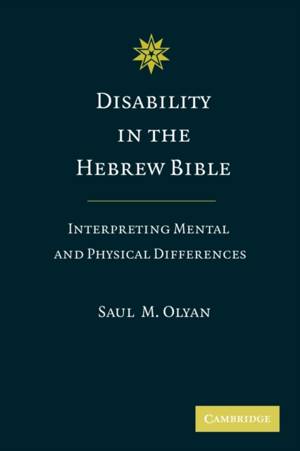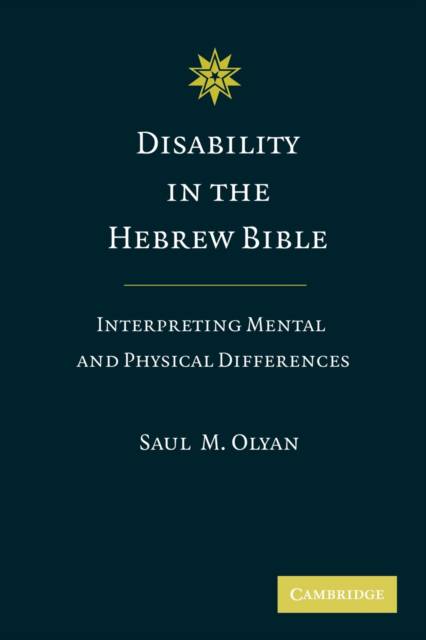
Door een staking bij bpost kan je online bestelling op dit moment iets langer onderweg zijn dan voorzien. Dringend iets nodig? Onze winkels ontvangen jou met open armen!
- Afhalen na 1 uur in een winkel met voorraad
- Gratis thuislevering in België vanaf € 30
- Ruim aanbod met 7 miljoen producten
Door een staking bij bpost kan je online bestelling op dit moment iets langer onderweg zijn dan voorzien. Dringend iets nodig? Onze winkels ontvangen jou met open armen!
- Afhalen na 1 uur in een winkel met voorraad
- Gratis thuislevering in België vanaf € 30
- Ruim aanbod met 7 miljoen producten
Zoeken
Disability in the Hebrew Bible
Interpreting Mental and Physical Differences
Saul M Olyan
Paperback | Engels
€ 72,45
+ 144 punten
Uitvoering
Omschrijving
Mental and physical disability, ubiquitous in texts of the Hebrew Bible, receive their first thoroughgoing treatment in this monograph. Olyan seeks to reconstruct the Hebrew Bible's particular ideas of what is disabling and their potential social ramifications. Biblical representations of disability and biblical classification schemas - both explicit and implicit - are compared to those of the Hebrew Bible's larger ancient West Asian cultural context, and to those of the later Jewish biblical interpreters who produced the Dead Sea Scrolls. This study will help the reader gain a deeper and more subtle understanding of the ways in which biblical writers constructed hierarchically significant difference and privileged certain groups (e.g., persons with "whole" bodies) over others (e.g., persons with physical "defects"). It also explores how ancient interpreters of the Hebrew Bible such as the Qumran sectarians reproduced and reconfigured earlier biblical notions of disability and earlier classification models for their own contexts and ends.
Specificaties
Betrokkenen
- Auteur(s):
- Uitgeverij:
Inhoud
- Aantal bladzijden:
- 202
- Taal:
- Engels
Eigenschappen
- Productcode (EAN):
- 9781107404984
- Verschijningsdatum:
- 19/07/2012
- Uitvoering:
- Paperback
- Formaat:
- Trade paperback (VS)
- Afmetingen:
- 152 mm x 229 mm
- Gewicht:
- 303 g

Alleen bij Standaard Boekhandel
+ 144 punten op je klantenkaart van Standaard Boekhandel
Beoordelingen
We publiceren alleen reviews die voldoen aan de voorwaarden voor reviews. Bekijk onze voorwaarden voor reviews.











